Opinion: Why is Bakkt's failure not surprising?
The launch of Bakkt should be the biggest bitcoin event of the year.
Bakkt was touted by its creators as a game-changer for the encryption industry. The company advertised that the introduction of physical settlement of bitcoin futures contracts is a revolutionary product.
Proponents believe that Bakkt will help release new demand for Bitcoin. They believe that the main institutional investors who were in the wait-and-see state will enter the market and start trading Bitcoins with confidence.
After nearly a year of delay, Bakkt finally went live on September 23.
- Bitcoin prices continue to fall, will the mining machine stop?
- Galaxy Digital will launch new bitcoin fund in November
- Speed reading | 5 sentences summarizing Vitalik's ETH2.0 series blog post, Nic Carter talks about the evolution of bitcoin as a safe-haven asset
Bakkt's first-day delivery futures contract was pitiful, with 105 futures contracts settled, with only 72 bitcoin transactions, and the total transaction amount was about $710,000. At the end of the first week, Bakkt's BTC futures trading volume remained very low, during which time it was less than $6 million.
In the past month, the activities on the Bakkt platform seem to have decreased. Most notably, the October 8 trading contract plummeted to a daily low of 25 bitcoins.
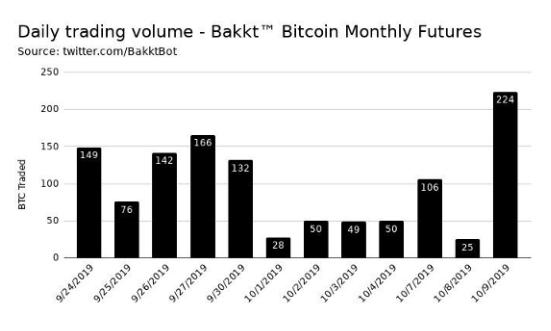
In contrast, the rival Chicago Mercantile Exchange (CME) has a first-time cargo volume of 5,298 BTCs, 75 times higher than Bakkt.
As early as December 2017, the Chicago Mercantile Exchange’s first day trading volume reached $100 million. In the first week of trading, the Chicago Mercantile Exchange cashed through its system, and BTC futures trade reached $460 million.
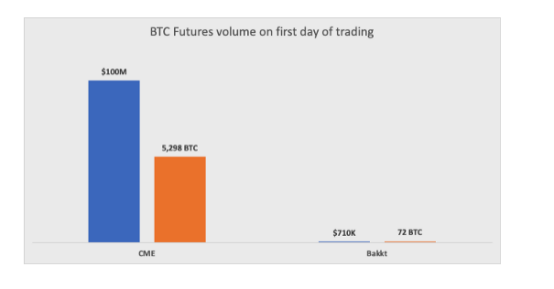
Some may say that it is unfair to compare Bakkt with its competitors, as the Chicago Mercantile Exchange's launch of BTC futures coincides with the ICO boom and the encryption boom in late 2017. However, this statement does not explain the current market dynamics.
While the level of activity and price of Bitcoin and other encryption markets has not returned to the level at the end of 2017, the Chicago Mercantile Exchange (CME) announced this year that bitcoin trading volume and open trade volume both hit new highs.
In October 2019, the company disclosed:
“In the third quarter, customers’ interest in the Chicago Mercantile Exchange’s Bitcoin futures remained strong, with more than 46,000 daily open positions, a 61% increase from the third quarter of 2018.”
CME also stated:
“Institutional financial flows remain strong, with 454 new accounts added, compared with 231 new accounts in the third quarter of 2018.”
The average daily trading volume of CME Bitcoin futures is currently $289 million, which makes Bakkt's trading volume dwarf.
Bakkt's listing is disappointing. One of the questions to be pondered is, for the company with $182 million in venture capital support, what made it so big?
In this article, the author will elaborate on the main reasons that he believes are the result of Bakkt.
Market demand for daily delivery contracts for spot delivery is weak
The main feature of Bakkt is that it uses a daily futures contract for physical delivery of bitcoin. However, it is this misguided product focus that is one of the key mistakes the company made before its launch.
In a cash-settled futures contract, such as a futures contract offered by the Chicago Mercantile Exchange (CME), when the contract expires, the trader will receive cash equivalent to the contract value. In the case of Bakkt, institutional investors obtained actual bitcoin through physical settlement of futures contracts. This is the value proposition that Bakkt has been emphasizing before it was released.
In an open letter issued on the day of launch, Pantera Dan Morehead, one of Bakkt's largest investors, wrote:
“The real innovation lies in the daily physical settlement.”
Kakly Loeffler, CEO of Bakkt, and I don't know that there are any daily settlements of futures contracts (in any asset class), at least in the US, which is indeed a revolutionary concept. ”
In the same letter, Dan continues to claim:
“We have hundreds of start-up exchanges right now. However, most organizations are uncomfortable with trading and collaborating with these entities.”
The author is not clear about the basis of this assertion, but it raises a question, why is there no physical settlement of bitcoin futures contracts until now? Moreover, why is the daily delivery of physical delivery so rare?
The answer may be: Due to the inherent advantages of cash-settled futures, the demand for such products is not large? After all, cash-settled futures buyers do not need to worry about custody, whether they are on a secure regulatory platform.
This is why in the financial sector, most futures are not physically settled because traders are usually not interested in the underlying assets.
When building a product, you first need to identify and resolve the real pain points that exist between potential customers. During the work of Facebook's product, the authors have been conducting small, controlled tests before leaving to create a blockchain venture capital fund. They do this to verify the hypothesis and decide whether to invest more valuable time and resources on certain products.
The authors don't know what tests Bakkt did before the product went on the market to assess the market adaptability of the product, but an in-depth study of the public data deepened the author's doubts about the lack of potential customer demand for Bakkt core products.
Of the 72 bitcoins traded on the Bakkt platform on the first day, 71 were traded through Bakkt's more traditional monthly futures contracts, while only one bitcoin was traded through daily delivery of physical delivery.
Yes, you are not mistaken, only one bitcoin transaction uses a pre-release version of Bakkt's main innovative form that is more attractive to new institutional investors!
Lack of focus is the cause of failure
What impressed Bakkt from the beginning was that they didn't seem to know who their main target audience was.
In a recent interview, CEO Adam White mentioned:
“Bakkt is actually designed for institutional traders, so this is a futures contract. That is, we expect this futures contract to be traded through a retail broker so that retail customers can trade the contract.”
Speaking of Bakkt's monthly futures, Adam said:
“This is not only important for speculators, but also for real companies that rely on bitcoin prices because they want to hedge risk, so we think this contract is perfect for them.”
Another turning point is that Bakkt CEO Kelly Loeffler pointed out in an interview with Furtune magazine:
“We are working together to create an open platform to help unlock the transformative potential of digital assets in global markets and businesses.”
From these comments, we don't know whether Starbucks is chasing institutional investors, retail investors, miners, consumers or businesses (Starbucks is a strategic partner of Baxter).
If the answer is above, then this is a problem in itself.
Fast access to the market, flexibility and focus are all important. A better approach is to identify and resolve a pain point, start a test, and then iterate from there. Otherwise, in the early days, you risk the risk of being too broad.
The Bakkt team seems to have taken the opposite approach, working on a pre-release product for a long time, while working to meet the diverse needs of multiple customer groups. This strategy is difficult to implement successfully, especially when you are just getting started.
Institutional investors are waiting for Bakkt to start bitcoin trading, which is somewhat far-fetched. Mature investors interested in such assets have already made an exposure
The top priority for Bakkt was to act as a bridge to traditional finance, making it easier for large institutions to trade Bitcoin.
However, those who want to gain access to Bitcoin have done so long before Bakkt used a variety of existing investment products such as OTC counters, investment trusts and cash settlement futures.
In fact, these financial products are easy to use for many institutions and senior financial professionals because, unlike Bakkt's physical settlement futures, they are trading with traders' daily transactions, allowing traders to settle transactions based on cash rather than underlying assets. Trading.
Product decisions have a negative impact on the product launch plan and cause significant delays
Bakkt was nearly a year late than its CEO's initial announcement (originally scheduled for November 2018). Part of the reason for the continued delay in Bitcoin trading seems to be that Bakkt intends to host Bitcoin for actual delivery to the dealer.
In order to provide qualified bitcoin hosting services, Bakkt needs to contact regulators such as the CFTC and the New York State Financial Services Authority to obtain the required approvals.
If Bakkt chooses to start with more traditional cash-settled futures (similar to Chicago Mercantile Exchange futures), then Bakkt may avoid some regulatory delays. You don't have to worry about bitcoin warehouses, you can go directly to the market.
Another blow is that Bakkt's continued delays allow new competitors to enter the market, while existing competitors are able to strengthen their solutions.
Since the launch of Bitcoin has been delayed for several months, Bakkt allows competitors such as LedgerX and TD ameritrade-backed ErisX to step up their own bitcoin futures contracts.
Binance, the world's largest cryptocurrency exchange, launched unregulated futures in September and entered the market. According to data from cryptocurrency data provider Skew, on October 15, Binance's new BTC/USDT futures product set a record of $700 million in transactions.
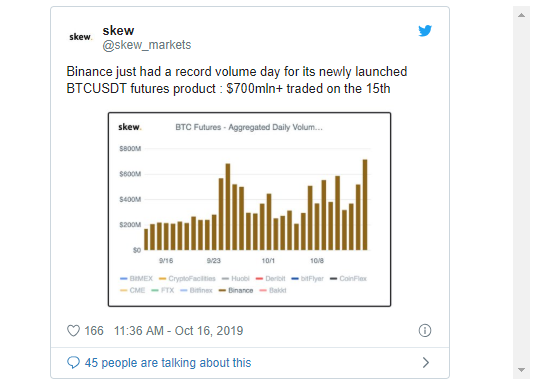
The rival Chicago Mercantile Exchange (CME) is also very busy. The company recently announced plans to supplement its bitcoin futures contract with options next year.
In terms of hosting, competition has intensified over the past year, and the Bakkt team is preparing to launch. For example, Fidelity Digital Asset Services has just announced that it is fully rolling out digital asset custody and trading services.
However, Bakkt CEO Kelly Loeffler does not seem to be worried about the increase in competition. In the month before Bitcoin was launched, she announced, “With the approval of the New York State Financial Services Authority, we will create Bakkt Trust, a qualified custodian. The Bakkt warehouse will provide hosting for bitcoin futures for physical delivery. “This provides customers with unprecedented regulatory transparency and security, while providing a regulated, globally accessible exchange in a market that lacks an institutional infrastructure.
Companies such as Coinbase, Bitgo, Kingdom Trust, and Gemini are now offering regulated, agency-level cryptocurrency hosting solutions and policies. What about their situation?
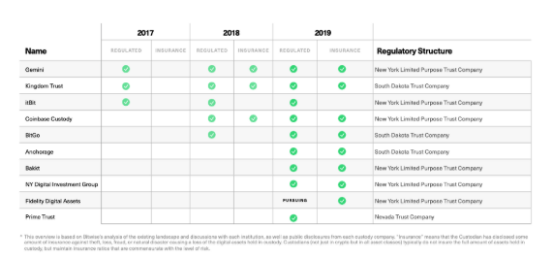
Source: Bit Asset Management's report to the US Securities and Exchange Commission on September 12, 2019
Some of these companies have a large user base, far exceeding the number of Bakkt users, and institutional funds are constantly flowing in.
For example, Coinbase CEO Brian Armstrong recently shared that the company now receives $200 million to $400 million in new cryptocurrency deposits per week from institutional clients.
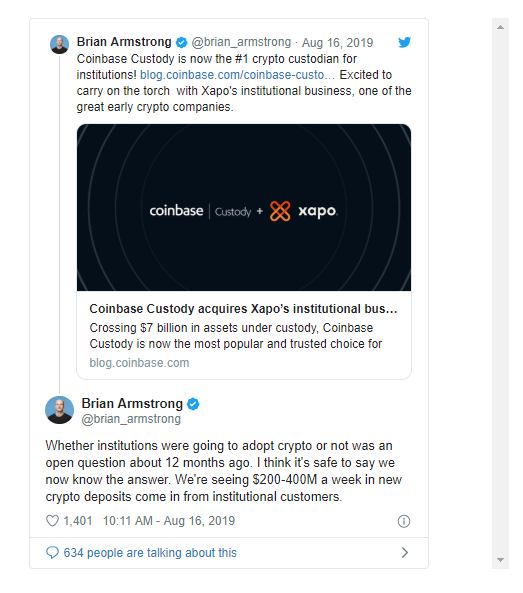
Bakkt layout is too big, too fast
Bakkt was founded by the $52 billion giant Intercontinental Exchange (ICE), whose parent company owns the New York Stock Exchange and many other exchanges. It uses ICE's strong reputation and financial resources to piece together an impressive list of supporters.
Prior to the product launch, Bakkt had received $182 million in venture capital from the most well-known companies in the field. Although the terms of the deal have not yet been announced, it is conceivable that Bakkt's valuation is between $750 million and $1 billion. This allowed the company to acquire digital asset escrow companies in April.
With such high expectations and jaw-dropping valuations, it is even harder to live up to expectations and achieve long-term success. The author's feeling is that Bakkt will get better service by adding a small amount of money and adopting a progressive startup method.
Of course, it might be helpful if the company can manage market expectations more aggressively. For example, when CEO Adam White compared Bakkt to the emergence of ATMs 50 years ago, this may be a bit overdone.
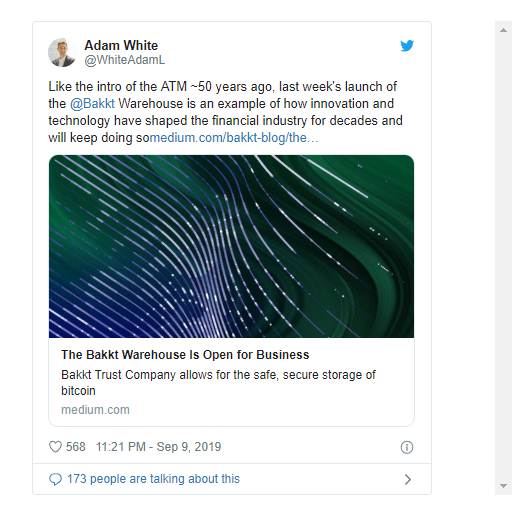
Bakkt has not come to an end
Still, this is not necessarily the end of Bakkt. Given Bakkt's huge sum of money and the expertise and financial strength of the Intercontinental Exchange, they can still reverse the situation.
These major mistakes have been in less than a month now and are still very early days. If the company makes the necessary adjustments, it may be able to rebound from a slow start.
A good start was to shift the focus of the product to cash settlement and beat the Chicago Mercantile Exchange in the launch of Bitcoin futures options.
It is important to confirm that ICE can provide verification for the entire blockchain and encryption industry.
Derivatives such as Bitcoin futures contracts provide a key solution for institutional investors to overcome operational and risk challenges.
Therefore, the introduction of regulated institutional-grade bitcoin futures contracts by ICE companies is another milestone in the rapid maturity of the encryption market.
Another advantage for Bakkt is that it can help the industry move from a price-settled process in an unregulated spot market to a more transparent compliance process that complies with standard anti-money laundering policies. In particular, Bakkt's price discovery mechanism can alleviate current concerns of the US Securities and Exchange Commission regarding future approvals for Bitcoin ETFs.
Regardless of whether Bakkt can finally attract attention, it is clear that the encryption industry has come a long way since Mt. Gox was hacked in early 2014.
Conclusion
As the author has previously said, opponents like Paul Krugman have completely wrong views on blockchains and secret cryptocurrencies. With disruptive blockchain technology, cryptocurrencies will gradually replace existing expensive and inefficient financial systems.
From the data point of view, Bitcoin is now more powerful than ever, and the launch of Bakkt proves the institutionalization of this emerging asset class.
In daily settlement of futures trading, Bakkt focused on Shantou and missed most institutional traders. Physical delivery is not a function that encourages institutional investors to participate in the market, and many people interested in Bitcoin have already had a certain degree of market exposure.
Bakkt chose to create a new financial instrument for the new asset class, and many Wall Streeters are still trying to master the tool. This means that they need both educational institutional investors to understand a new asset class and a new trading concept that is unfamiliar to many traders.
How many institutional investors will plan to put their careers on a new platform in an emerging asset class and start operating contracts on the first day of launching this new product?
The Bakkt team did not simplify their listing process, nor did they launch a streamlined MVP approach as soon as possible, but unnecessarily complicated the regulatory aspects.
If the company launches bitcoin futures that are settled in cash and concentrates more on building new customers, it may get better service.
So the expectation that Bakkt will be able to bring in a lot of new institutional capital inflows is unrealistic.
The Bakkt team spent a lot of time developing products that were suspicious. Evidence to date suggests that the launch of daily spot BTC futures may be in a case where you can see the problem, not a solution to the problem.
We will continue to update Blocking; if you have any questions or suggestions, please contact us!
Was this article helpful?
93 out of 132 found this helpful
Related articles
- Google, Internet Stock and Ethereum
- BiClub realizes full automation of OTC platform and helps build a large-scale digital asset financial service system
- Let the transaction speed reach 1 million TPS in the future, and the Ethereum expansion solution officially released
- Bitcoin options are coming, will Bakkt help or help?
- Staking Economics: Avoiding the centralization of network power, how does “reverse incentives” work?
- Twitter CEO: Twitter will never join Facebook's Libra project
- Viewpoint | Is the exchange the only way out for the project?





